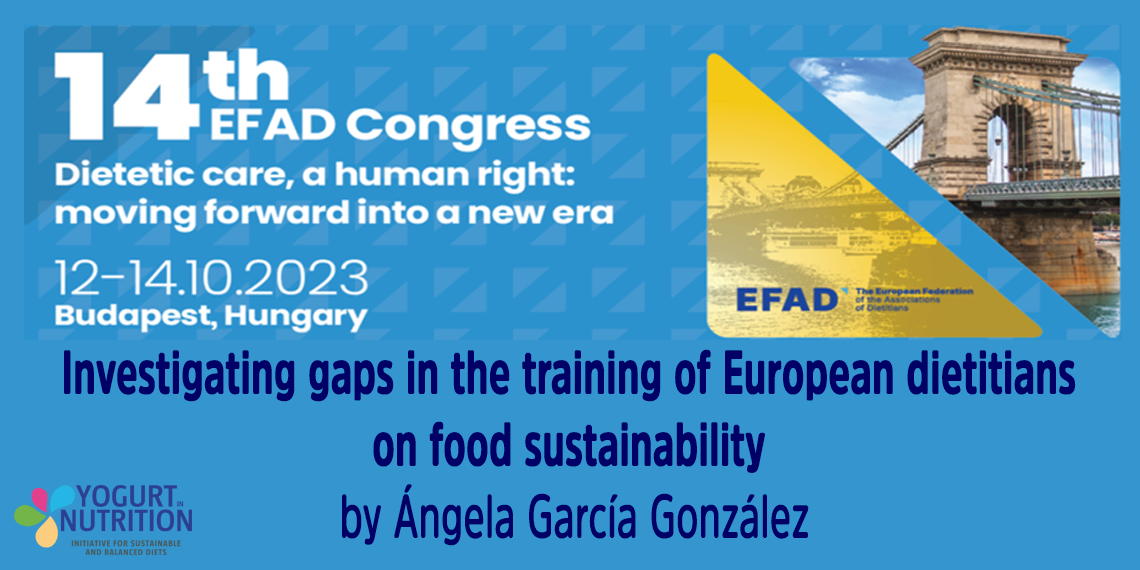In October 2023, the 14th EFAD (European Federation of Association of Dieteticians) Congress was the occasion of exchange and networking around nutrition. We were there to share with you some topics.
Investigating gaps in the training of European dietitians.
There is a need to change people’s eating habits towards a more sustainable diet. Dietitians are the professionals who should lead this habit change, but are they prepared to do so?
In 2022, two students (CEU-San Pablo University, Madrid) and Artesis Platijni University of Applied Sciences, Antwerp) developed a joint thesis project. The aim was to find out what knowledge dietetics students and practicing dietitians have about food sustainability, with the purpose of highlighting possible gaps in the training of dietitians in Europe related to sustainability.
The study involved 94 students and 228 dietitians from 7 different European countries. The participants showed a significant lack of knowledge and skills in food sustainability:
- 40% of the respondents said they did not feel able to provide sustainable advice in clinics;
- 60% did not feel confident in designing sustainable menus for communities and
- 35% said they were not able to develop educational programs to promote sustainable food.
All agree that they should pay more attention to sustainability aspects of food and nutrition, and that sustainability should be included in dietetic studies in a transversal way or through specific courses in the dietetic curricula.
In addition, there is a need for focused lifelong training addressed to practicing dietitians.
Key messages:
- The training of dietitians should be improved on food sustainability, either through specific courses or in a transversal way.
- Research on the training shortcomings of practitioners contributes to the advancement of dietetics, while increasing students’ awareness of lifelong learning.
- International collaborative studies are a good tool to increase students’ soft skills and the significance of their research.
Learn more with Ángela García González
Can you introduce yourself in a few sentences?
I am Ángela García González and I am teaching nutrition in San Pablo-CEU University. I’m a PhD, I’m a medical doctor, in fact, but I’ve never ever, ever worked as a doctor. I always say that I’ve got a dietitian cert and that’s it, really, because all my life I’ve been working in the academy and in research and education for dietitians. That’s why I’m here, in fact, and I’ve been part of EFAD since the diets started in 2008. I’ve been part of EFAD for a long time. I teach and do research mainly in public health nutrition aspects. I love sustainability and that’s why I’m more into that.
You have presented a study that was conducted by PhD students. It points out that the sustainability aspect is not taught enough. What would be your recommendation for improving the training of dietitians on food sustainability?
What we have to do is to improve our curricula as teachers. We are building a network between those who are very interested in teaching sustainability. We had a meeting in Dublin, and when we asked the question “What is the best way to learn sustainability and to put this subject in the curriculum?” Most people suggested to put a bit in every courses. And that’s, of course, important. Personnaly, I think that sustainability deserves the importance of having its own topic. It will help the students to have an holistic view of the topic. We can maybe also have other modules that are not in the curricula of dietitians such as environmental science or policy advocacy, which are important for sustainability. It’s difficult because there are already a lot of things in the curriculum, but I think that we’re clever enough to do it. There are a lot of other topics such as genetics or immunology that would not have been in the curriculum 10 years ago, but now they are. Why not sustainability?
This research work was about training, how can we ensure that this research can be translated into practice; that what they are learning is going to be used?
I think that all the competencies that you need to do research will be important in your practice, even if it’s not research. You learn a lot of new competencies that you can use either for research or not.
One last question, about the opportunities for international collaboration. Are they going to be more widely adapted?
We are open. In fact, the more we are and the more diverse we are, the more interesting the project is. When we started, we had students from Italy, Finland, Netherlands, Belgium, and Spain. It was really interesting. But I don’t know how (maybe it was a time frame problem) but we lost some participants and the work was finally only done by 2 students (in Belgium and Spain). But we would love to have new partners and new cultural points of view.



